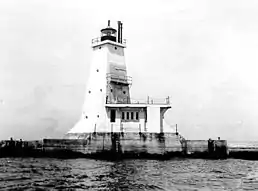.jpg.webp) Ludington Light in August 2023 | |
| Location | Ludington, Michigan |
|---|---|
| Coordinates | 43°57′13.002″N 86°28′9.737″W / 43.95361167°N 86.46937139°W |
| Tower | |
| Constructed | 1871 |
| Foundation | Pier |
| Construction | Steel / Reinforced concrete |
| Automated | 1972 |
| Height | 57 feet (17 m) |
| Shape | Square Pyramidal |
| Markings | white with black lantern |
| Heritage | National Register of Historic Places listed place |
| Fog signal | HORN: 2 blasts ev 30s (2s bl-2s si-2s bl-24s si). Operates from Apr. 1 to Oct. 1.[1] |
| Light | |
| First lit | 1871 |
| Deactivated | N/A |
| Focal height | 55 feet (17 m) |
| Lens | fifth order Fresnel Lens (original), 12-inch (300 mm) Tideland Signal ML-300 Acrylic Optic (current) |
| Intensity | 5000 candles |
| Range | 5 nautical miles (9.3 km; 5.8 mi) |
| Characteristic | Iso G 6s 55 |
Ludington North Breakwater Light | |
 | |
| Location | Ludington, Michigan |
| Built | 1924 |
| NRHP reference No. | 05000982[2] |
| Added to NRHP | September 6, 2005 |
The Ludington Light is a 57-foot (17 m) tall steel-plated lighthouse in Ludington, Michigan, which lies along the eastern shores of Lake Michigan, at the end of the breakwater on the Pere Marquette Harbor. Given its location on the northern breakwater where the Pere Marquette River meets Lake Michigan, it is sometimes known as the Ludington North Breakwater Light. Underlying the building itself is a prow-like structure, which is designed to break waves.
History
The station was established in 1871. This light was first lit in 1924, and it is presently operational. It was automated in 1972. The light is structurally integrated into the steel and reinforced concrete pier upon which it is built. It has a square pyramidal form, and is white with a black lantern. The original lens was a Fourth Order Fresnel lens.[3] On October 17, 1995 the Fresnel lens was removed from the lantern. It was replaced by a 12-inch (300 mm) Tideland Signal ML-300 acrylic optic.[4] The original lens was loaned to Historic White Pine Village where it is displayed as part of their maritime history exhibit.[5]
A fog signal building is integrated into the tower. It originally had a Type F Diaphone signal, and a FA-232 is now in operation. A radio beacon is also in place and operational.[6]
In 2006, the Ludington Breakwater Lighthouse was opened to the public for the first time in its history. The Coast Guard transferred ownership to the City of Ludington under the terms of the National Historic Lighthouse Preservation Act. The lighthouse is being operated and maintained in partnership with the Sable Points Lighthouse Keepers Association,[7] which is a volunteer group that maintains, restores and operates this light, the Big Sable Point Lighthouse and the Little Sable Point Lighthouse.[8]
The lighthouse is open to the public during the summer season for climbing tours.
See also
References
- ↑ Light List, Volume VII, Great Lakes (PDF). Light List. United States Coast Guard.
- ↑ "National Register Information System". National Register of Historic Places. National Park Service. 2009-03-13. Archived from the original on 2008-07-25. Retrieved 2010-08-03.
- ↑ "Historic Light Station Information and Photography: Michigan". United States Coast Guard Historian's Office. Archived from the original on 2017-05-01.
- ↑ "Seeing The Light - The 300mm plastic lighthouse optic". Retrieved 1 August 2016.
- ↑ "Seeing The Light - Ludington North Pierhead Lighthouse". Retrieved 1 August 2016.
- ↑ "Ludington North Pier Lighthouse, MI". Retrieved 1 August 2016.
- ↑ Lighthouse depot newsletter Archived 2007-12-17 at the Wayback Machine
- ↑ "Big Sable Point Lighthouse - Ludington Mi -". Archived from the original on 2008-06-15. Retrieved 2008-06-11.
Further reading
- Bibliography on Michigan lighthouses.
- Crompton, Samuel Willard & Michael J. Rhein, The Ultimate Book of Lighthouses (2002) ISBN 1-59223-102-0; ISBN 978-1-59223-102-7.
- Hyde, Charles K., and Ann and John Mahan. The Northern Lights: Lighthouses of the Upper Great Lakes. Detroit: Wayne State University Press, 1995. ISBN 0-8143-2554-8 ISBN 9780814325544.
- Jones, Ray & Bruce Roberts, American Lighthouses (Globe Pequot, September 1, 1998, 1st Ed.) ISBN 0-7627-0324-5; ISBN 978-0-7627-0324-1.
- Jones, Ray,The Lighthouse Encyclopedia, The Definitive Reference (Globe Pequot, January 1, 2004, 1st ed.) ISBN 0-7627-2735-7; ISBN 978-0-7627-2735-3.
- Noble, Dennis, Lighthouses & Keepers: U. S. Lighthouse Service and Its Legacy (Annapolis: U. S. Naval Institute Press, 1997). ISBN 1-55750-638-8; ISBN 978-1-55750-638-2.
- Oleszewski, Wes, Great Lakes Lighthouses, American and Canadian: A Comprehensive Directory/Guide to Great Lakes Lighthouses, (Gwinn, Michigan: Avery Color Studios, Inc., 1998) ISBN 0-932212-98-0.
- Penrod, John, Lighthouses of Michigan, (Berrien Center, Michigan: Penrod/Hiawatha, 1998) ISBN 978-0-942618-78-5 ISBN 9781893624238.
- Pepper, Terry. "Seeing the Light: Lighthouses on the western Great Lakes".
- Putnam, George R., Lighthouses and Lightships of the United States, (Boston: Houghton Mifflin Co., 1933).
- United States Coast Guard, Aids to Navigation, (Washington, DC: U. S. Government Printing Office, 1945).
- Price, Scott T. "U. S. Coast Guard Aids to Navigation: A Historical Bibliography". United States Coast Guard Historian's Office.
- Wagner, John L. "Beacons Shining in the Night: The Lighthouses of Michigan". Clarke Historical Library, Central Michigan University.
- Wagner, John L., Michigan Lighthouses: An Aerial Photographic Perspective, (East Lansing, Michigan: John L. Wagner, 1998) ISBN 1-880311-01-1 ISBN 9781880311011.
- Wargin, Ed, Legends of Light: A Michigan Lighthouse Portfolio (Ann Arbor Media Group, 2006). ISBN 978-1-58726-251-7.
- Wright, Larry and Wright, Patricia, Great Lakes Lighthouses Encyclopedia Hardback (Erin: Boston Mills Press, 2006) ISBN 1-55046-399-3
